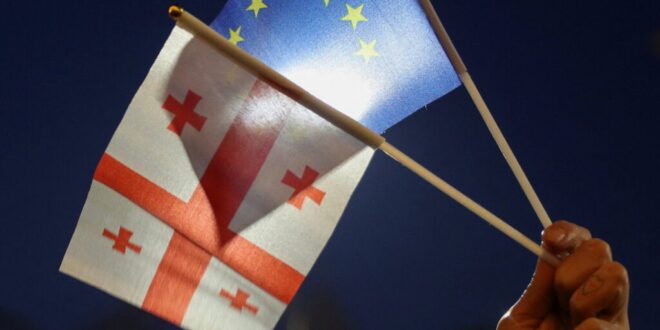Georgia’s ruling party is pushing ahead with plans to pass legislation tightening restrictions on civil society, despite widespread domestic alarm along with expressions of concern from the EU and US. The new law mirrors earlier draft legislation that was shelved in spring 2023 following widespread protests and comes as the country prepares for parliamentary elections in October.
The proposed legislation would oblige civil society organizations receiving more than 20% of annual funding from sources outside Georgia to openly state that they are “pursuing the interests of a foreign power.” They would be required to register as foreign agents and subjected to extensive additional reporting requirements. Organizations that fail to do so could face large fines.
Critics say the bill is very similar to Russia’s draconian foreign agents legislation, which is widely seen as a tool for the Kremlin to target potential dissidents and silence civil society. The similarities between the law proposed by the Georgian authorities and restrictions already in place inside Russia helped fuel large-scale protests in Tbilisi last year, with many denouncing what they termed as the “Russian law.”
Renewed efforts to pass last year’s foreign agents bill have sparked fresh debate over Georgia’s future. Opposition groups see the return of the draft law as a further indication of the ruling Georgian Dream party’s intention to steer the country away from Europe and toward Russia. The move comes just months after Georgia achieved a major breakthrough by securing official EU candidate nation status in December 2023.
EU officials voiced “regret” that Georgia’s foreign influence legislation was once again under consideration despite being “unconditionally” withdrawn last year. “Transparency should not be used as an instrument to limit civil society’s capacity to operate freely,” read an EU statement. “We encourage the political leaders in Georgia to adopt and implement reforms that are in line with the stated objective of joining the European Union, as supported by a large majority of Georgia’s citizens.”
The United States also voiced its concerns over the reappearance of the contentious foreign agents law. The largely unchanged draft legislation “undermines Georgia’s commitment to Euro-Atlantic integration and risks pulling Georgia off its European path,” commented US Department of State spokesperson Matthew Miller.
When officials from the ruling Georgian Dream party first proposed new legislation to curb foreign influence in February 2023, the backlash was so strong that the draft law was ultimately withdrawn from consideration. Thousands rallied against the bill in Tbilisi, leading to clashes with police that generated global headlines.
Criticism also came from a range of international human rights watchdogs. “The foreign agent bill seeks to marginalize and discredit independent, foreign-funded groups and media that serve the wider public interest in Georgia,” commented Hugh Williamson, Europe and Central Asia Director for Human Rights Watch.
The reintroduction of the foreign agents law ahead of parliamentary elections in October casts a shadow over Georgia’s democratic progress. Critics say this renewed push to pass legislation virtually identical to last year’s abandoned bill is part of the Georgian Dream party’s efforts to silence opponents. They accuse the Georgian authorities of backsliding on the core values underpinning the country’s declared goal of securing a democratic, European future.
These concerns reflect fears over Russian influence. Despite widespread public opposition to Russia’s role in the country, the Georgian Dream party has long faced accusations of seeking to foster closer ties with the Kremlin. Russia continues to occupy approximately 20 percent of Georgia, and has recently announced plans to construct a major naval base on the Black Sea coast in Georgia’s occupied Abkhazia region.
Over the past two years, the Georgian authorities have responded ambiguously to the full-scale Russian invasion of Ukraine. Georgia has refused to join international sanctions or restrict trade with Russia, while Georgian PM Irakli Garibashvili echoed the Kremlin in May 2023 by claiming NATO enlargement was one of the main reasons for the war in Ukraine. Georgia also recently relaunched direct flights to Russia.
In the coming weeks, Georgia’s revived foreign influence legislation is expected to be reviewed by a parliamentary committee. A new round of protests against the law has already begun in the capital, and could serve as a focal point for opponents of the current authorities. The further passage of the law will reveal much about the Georgian Dream party’s grip on power, while also providing an indication of the country’s future geopolitical trajectory.
 Eurasia Press & News
Eurasia Press & News



